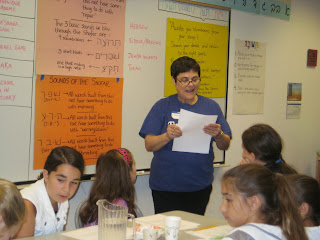During the coming year, our Edot students will be learning about the cultures and values of the Jewish Diaspora communities of Ethiopia, Iraq, Spain, and Yemen. A major theme throughout our studies will be to explore why and how these Jews maintained a strong Jewish identity for centuries, in spite of being separated from each other. But before we can begin discussing these looming issues, we have to ask ourselves a very basic question - what does it mean to be Jewish?
This is precisely the question I posed to the Edot students yesterday. How can you tell if someone is Jewish? If we can figure out the answer to that question, we can have a good chance of figuring out what it means to be Jewish. We had quite an animated and fruitful discussion each session, during which students shared what they have learned to date at home and at school about Jewish symbols, rites, holidays, clothing, music, etc.
We concluded that to be Jewish means to be a member - a citizen, if you will - of the oldest surviving nation on our planet. We conform to the four necessary attributes of a nation - we have a language, a land, laws, and history in common. Because of our very long and unique history, we were forced to live outside of our land - Israel - for almost two millenia (some of us, we will learn, even longer than that!), but we always kept its memory alive in our hearts and minds. We kept our Hebrew language in our prayers, and also integrated it into new languages spoken in Europe, Spain and Portugal, the Middle East and North Africa - Yiddish, Judeo-Spanish (Ladino), and Judeo-Arabic, respectively. And we studied and taught the Torah, which we had written down during the Babylonian Exile, some 2,500 years ago. The Torah is both our national history book (along with succeeding Biblical books in the "Prophets" and "Writings" section of our Hebrew Bible) and our constitution. What we refer to as commandments, are the laws of our nation.
We looked at our holidays and religious rites, and saw that each was developed very carefully by the Talmudic era Rabbis, to keep our national memory and pride alive. We concluded our discussion by having the students share what they thought we should study in Religious School in order to ensure that a new generation will learn enough about our nation to transmit the memory and pride of our roots to a new generation after them. We should, the students said, study Hebrew, Jewish history, the geography of Israel, and learn the important laws.
This is precisely what I intend to share with them, as my teachers and parents shared with me. Am Yisrael Chai - the Nation of Israel lives!
 |
| We started our discussion by having each student share his/her first name (not nickname!). I wrote each name down in different columns and asked the students to try to figure out the pattern. The pattern was the language of origin of each name. When I asked why all our names aren't under the "Hebrew" column, they answered, "Because Jews live everywhere." What a great segue to the topic of what it means to be Jewish. |
 |
| How can you tell if someone is Jewish? There were lots of ideas! |
|
What should we learn in Religious School this year to help us be good citizens of the Jewish nation? Hebrew was the first subject that came up. And so, immediately following our discussion, we began our Hebrew studies for this school year with a review of the Hebrew Through Movement program vocabulary. All the students were familiar with the program from last year, and what a wonderful surprise for me to realize that they had all remembered the basic vocabulary that I reviewed with them yesterday.
 |
| Baneem La'koom (Boys, stand up) |
 |
| Banot la'koom (Girls, stand up) |
 |
| Baneem la'rootz (Boys, run) |
 |
| Jake v' Mia, la'shevet al ha'reetzpa (Jake and Mia, sit on the floor) |
 |
| Stephen, la'rootz el Zach (Stephen, run to Zach) |
This coming Tuesday and Wednesday, students will begin to attend Hebrew electives which they chose during the past week day sessions. Rabbi Greninger described our new Hebrew elective program to all the 5th and 6th graders, then gave them a form with elective topics to choose from, such as cooking, games, and Hebrew conversation. Sixth graders will participate for 12 weeks in a "Hebrew Boot Camp," working one-on-one with an assigned tutor to learn decoding skills. They'll be able to participate in the elective program before or after the boot camp is over. There will be 4 six-session elective units, and students will be able to choose new electives after each session. I'll be leading the cooking elective, together with Ellie, one of the Teva (nature) teachers for 3rd and 4th graders. Our elective will give new meaning for getting a "taste" of the Hebrew language.
 |
| Choosing Hebrew electives in the Beit Knesset |
















